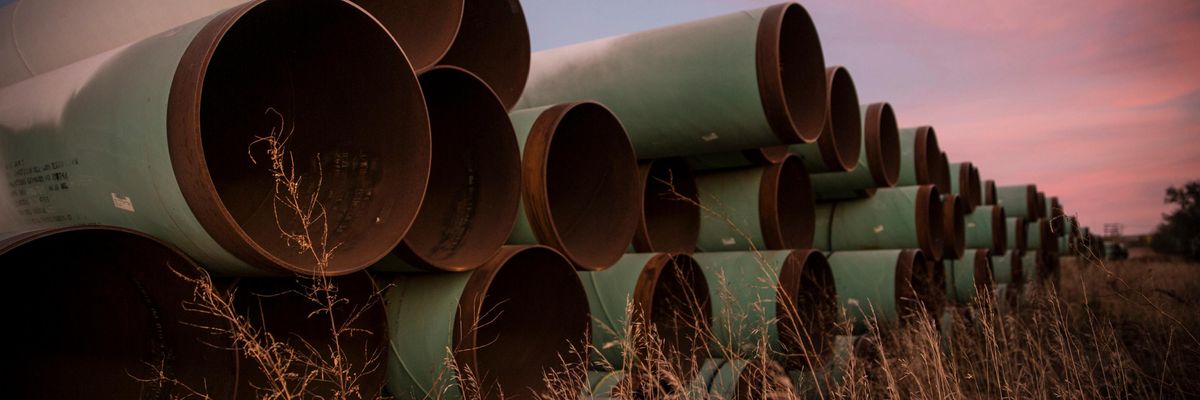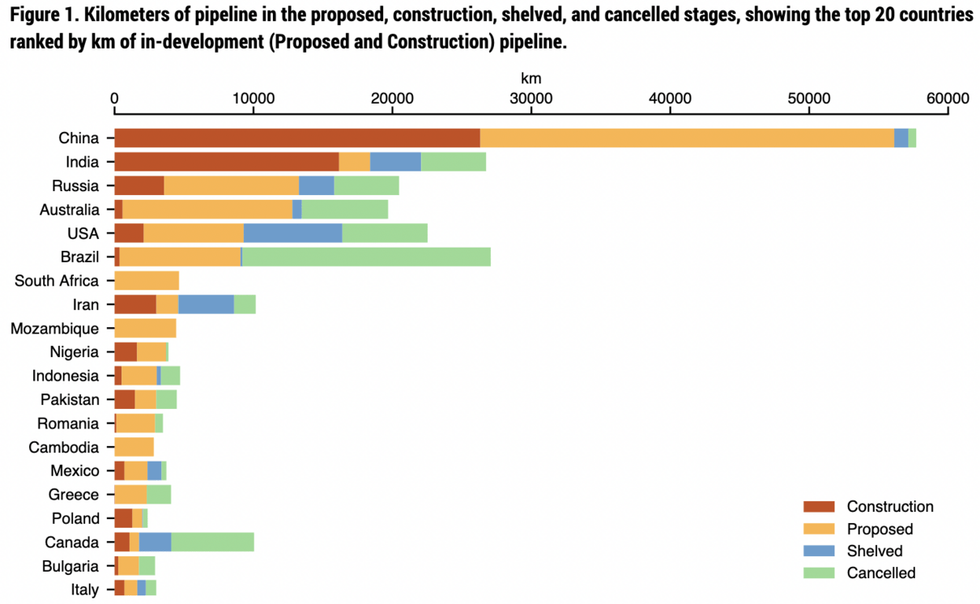As campaigners and scientists continue to demand keeping fossil fuels in the ground, an analysis on Tuesday revealed the incredible amount of gas development humanity has planned, despite the climate and financial risks.
"The world is at an inflection point, where it can hasten the transition to renewables or further entrench itself in fossil fuels."
The new report--entitled Pipe Dreams 2022: Stranded assets and magical thinking in the proposed global gas pipeline build-out--was authored by a trio of experts at the San Francisco-based Global Energy Monitor (GEM).
"A slowdown in gas pipeline development in 2021 was, unfortunately, more about Covid than a recognition that gas is contributing to the climate crisis," said report co-author Baird Langenbrunner, a research analyst at GEM, in a statement.
"Looking ahead, the fact that nearly half-a-trillion dollars of gas pipelines are in development makes no sense economically," he warned, "as many of these projects will become stranded assets as the world transitions to renewable."
Stranded assets, as Carbon Tracker explains, are "assets that turn out to be worth less than expected as a result of changes associated with the energy transition."
The GEM report states that "after a Covid-19-related drop in pipeline commissionings in 2021, the gas industry and gas-positive countries led by China, India, Russia, Australia, the United States, and Brazil are pushing ahead with plans to commission tens of thousands of kilometers of gas pipelines in 2022."
The analysis projects that the planned expansion of the global gas pipeline network--70,889 kilometers (km) or 44,048 miles in construction and another 122,477 km or 76,104 miles in pre-construction development--creates a $485.8 billion stranded asset risk, in addition to jeopardizing the chances of meeting the Paris climate agreement's goals.
China leads with 56,120 km (34,871 miles) of pipeline proposed or under construction. India follows with 18,389 km (11,426 miles), then Russia with 13,267 km (8,244 miles), Australia with 12,798 km (7,952 miles), the United States with 9,295 km (5,776 miles), and Brazil with 8,021 km (4,984 miles).
The planned expansion in China amounts to a stranded asset risk of $89.1 billion, the analysis says, noting that "the Chinese pipeline boom is happening under the direction of the newly created conglomerate PipeChina, the world's second-largest developer of gas pipelines behind Russia's Gazprom."
In the United States, "rising opposition from NGOs and activists, and a shifting legal and regulatory landscape, contributed to the defeat of several high-profile pipelines in 2020-21," the report points out. "However, there are still pipelines costing an estimated $47.6 billion being developed, and the U.S. is expected to become the world's leading exporter of gas in 2022."
Climate activists have accused U.S. President Joe Biden of failing to meet his campaign promises by enabling ongoing and future fossil fuel development.
Related Content
US Gas Exporters Set to Benefit After Germany Halts Russian Pipeline
Kenny Stancil
Expansion of gas infrastructure around the world is underway despite warnings from climate scientists and other experts--including the Paris-based International Energy Agency (IEA)--that humanity must stop extracting and burning fossil fuels to meet the more ambitious Paris goal of limiting global temperature rise this century to 1.5degC above preindustrial levels.
"The world is at an inflection point, where it can hasten the transition to renewables or further entrench itself in fossil fuels," the analysis states, calling planned pipelines "counterproductive to the 1.5degC Paris goal and a green transition."
The report also emphasizes that the global expansion's scale and lifetime stand "in misguided defiance of the IEA's net-zero pathway, which stresses no new investment in fossil fuel supply projects."



